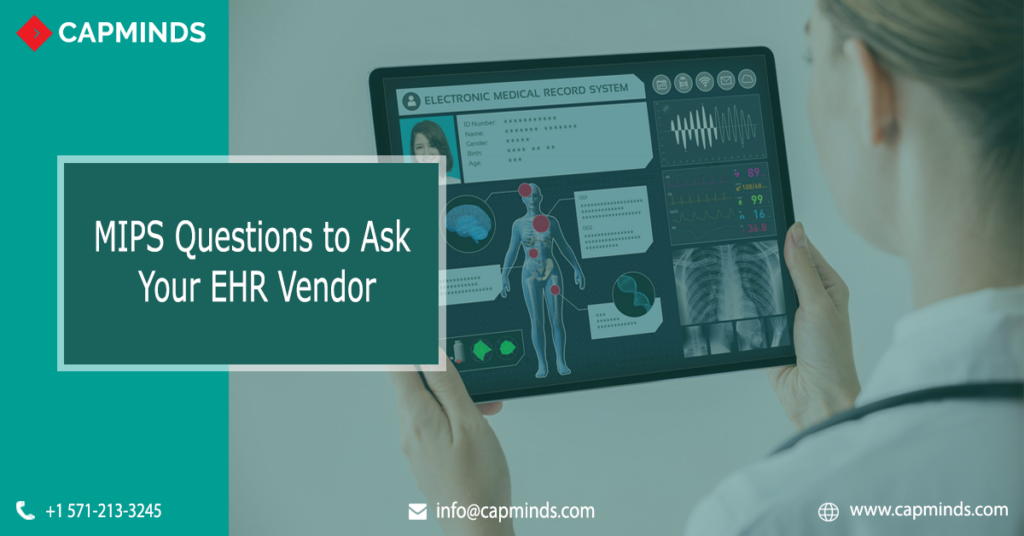MIPS questions to ask your EHR vendor
If you choose an EHR vendor because they have a flashy website and are good at their retargeting game, then you might be putting yourself in a lot of trouble. You need to have the right strategy when you are about to hire an EHR vendor. There are high chances that you might fall for good marketing, don’t worry, we are here to help you ask the right questions that will guide you towards the right EHR system for your healthcare organization.
Switching your EHR vendor is a big decision and finding the right fit will play a part in your success. We have compiled a list of 10 questions that you should ask your HR vendor. Choose an EHR vendor that understands your workflow and which has the right tools that complement your business will help you move in the right direction.
The answers from your EHR vendors to these 10 questions will help you choose the right EHR vendor that will help you reach your business goals.
Here are 10 questions that you should ask your EHR vendor:
1 How will your company help us be successful in MIPS?
The vendor should have a built-in MIPS composite score reporting, analytics dashboard, report generating feature, and so on. It should also come with patient engagement tools such as patient portal, patient kiosk, telemedicine and other advisory services. These are essential for success in MIPS.
2 What clinical practice improvement activities will be included in the company’s EHR?
While EMR vendors don’t have to be certified by CPIA, it is imperative that providers have them. Not only does it improve MIPS score, but it also increases efficiency.
Here are the following options that should be included:
- Intensive care Management
- Medication Management
- 24*7 access to MIPS-eligible clinicians
- Be a part of clinical data registries run by government agencies
- Enhanced patient portal
3 What functionality is available to track the measures?
Physicians want to know if the data surrounding them is in order and if it can be collected at any point of time without any issues. You need to ask what are the specific tools the EHR vendor has that will help track and measure performance.
4 What are the certifications that your EHR vendors have?
MACRA requires physicians to use technology that has been certified using the Office of the National Coordinator’s (2015) Edition Health IT certification criteria.
You should ask your vendor about their plans to adopt the 2015 requirements.
5 Can the system generate reports that will see the effectiveness of certain areas?
We all know that if clinicians have to be successful, there should be continuous monitoring of their performance. It is imperative that you track performance points to track how well they are doing. It isn’t something that should be done sporadically, you need to do it at regular intervals. Find out what are the reports that would be available and ensure that they are the right fit to make your business a success.
6 Will we get everything that is required to become successful with MIPS or should I outsource any functionalities outside?
The vendors should have everything that is required to be successful with an MIPS system. There should be no need for you to go to a third-party vendor as it will not only be extra money spent, but also a lot of time wasted in terms of communication and outreach. But if you find a tool that has most features that you are looking for and you see that it is the perfect fit, then don’t think too much about going for it.
7 How does your solution help optimize the numerator score for quality measures?
The bonus payment for a physician depends on their performance in each category. If they want to avoid any penalty, then the physicians must report at least one quality measure for a patient. They should also engage themselves in any practice improvement activity or they should submit the Basic Advancing Care information requirements.
If physicians want to maximize potential bonus payments, then they must report six quality measures including at least one outcome measure or one specialty-specific measure for a period of 90 days. Physicians can choose the quality measures from nearly 300 measures that are approved by CMS which align with patient populations and specialty.
8 What type of interoperability does your EHR vendor provide?
Interoperability allows physicians to track and coordinate patient’s care. Ask them if they have developed an interface with the CommonWell Health Alliance, which is a trade association of health IT companies working together to create universal access to health data worldwide. It indicates the will of your vendor when it comes information sharing.
Ask your vendor if they have features in place to support ACOs and other advanced APMs?
Ask them to describe the features in detail and also about the advanced APMs that the vendor has worked with previously.
What is the vendor’s strategy while working with these APMs?
9 Does the EHR vendor enable patient management?
Physicians must be prepared to provide patient access to EHR data in the advancing care information category of MIPS. Some of the other requirements are 1. E-prescribing, 2. Performing risk analysis, 3. Sending care summary, 4. Request/accept care summary.
Apart from the above requirements, ask your EHR vendor if they can satisfy advancing care information requirements.
10 What data analytics tools does your EHR vendor provide?
Your EHR vendor should provide robust analytics and performance dashboards that will help you achieve the following goals: 1. Benchmarking of performance, 2. Clinical care and process improvement, 3. Resource utilization, 4. 4. Tracking quality.
Let’s assume that your vendor doesn’t provide this type of data analysis, then does it allow integration of 3rd party applications to access data through APIs? If the answer to it is a yes, then you can surely go ahead. If the answer is a no, then you can ignore the EHR vendor because you need to have analytics, only then you can measure things that are necessary.
Conclusion:
Your EHR vendor should help you take steps to maintain compliance and avoid auditor scrutiny. If you think that your current EHR vendor is lacking in many areas, you might be wasting a lot of time if you expect them to get themselves to update the product. You will be in a better position if you proactively search for an EHR system which has all these features and functionalities.

 Author: Pandi Paramasivan
Author: Pandi Paramasivan
![The Guide to Custom EHR Application Development [Features + Benefits]](https://www.capminds.com/wp-content/uploads/2024/11/Blog-Featured-Images-2024-11-25T110915.039-400x250.jpg)

